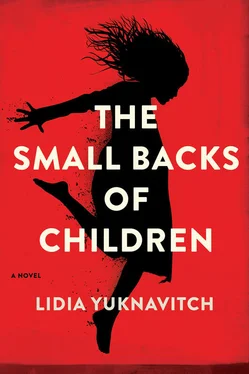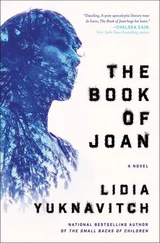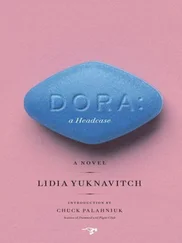All of this happens without the photographer. The photo, after all, is out of her hands. Later, it will be professionally and lovingly developed again — this time by hand, not machine.
Calling from a crackling phone in some hole-in-the-wall, she does give the editorial assistant one direction: Make sure the writer gets a copy of the photo. Send it right away. Write “this is the girl” on a scrap piece of paper. Then she hangs up, smiling, thinking of the writer. Hoping for her intimacy.
And so, the first time the girl comes to the house, the writer is at work on her novel.
She takes the package into her living room.
She pulls the cardboard strip that slits the belly of the package open.
Briefly she pictures the photographer’s hands.
She reaches inside and pulls the framed photo out.
It is wrapped in brown paper.
Scrawled across the front of the paper in some stranger’s hand: This is the girl.
A whisper of star-cluster emotions move briefly through her heart. She stares at the handwriting.
She unwraps the photo.
She looks.
Her pupils dilate, as they do in the dark, or when we shift focus from something far to something near, or when we are very much attracted to something, or when we enter an altered state.
Yes. This is the girl.
Once, when her husband was out of town at a film festival where his work was appearing, the writer took their son on a photo shoot. She bought two Kodak Instamatic cameras. She drove to the edge of the big river running through their city. It was a gray day — the kind of gray sky where the clouds look like they are holding the rain in their arms. They ran alongside the river along the river rocks, brushed their bodies inside patches of river reeds, examined a dead seagull drawn inland, collected little shells and stones. She showed him how to use the Kodak camera. His hands more adept at making things than he had language for. His cheeks two blooms.
They took photos for hours.
When she had the film developed, she took joy in his images — barely focused close-ups of rocks and sand and detritus. Odd-angled images of water and broken glass. The big gray of the sky that day. The eye of the dead seagull. And then she saw an image of herself that he’d taken. Her blond hair blowing across her face, her too-red winter wool coat, her arms so outstretched for him that they look as if they are about to pull off and away. It may be the truest image of herself she’s ever seen.
She makes a promise to herself: Remember to let go. When the time comes. Remember that you must.
The widow hears the girl make noises in her sleep. One night, when she hears the girl moaning, she pulls a blanket around her own shoulders and pads her way to the girl’s bed to rub her back, to take her from nightmare to otherwhere, but when she arrives at the body of the girl she realizes she is not moaning.
She is laughing.
Another night, the widow is again pulled from sleep by the sound of the girl — she is walking toward the front door. Is she sleepwalking? The widow believes it: Whatever this girl has been through, it must have lodged in her subconscious forever. Likely this girl will be haunted the rest of her life. But again, when she reaches the girl, when she extends her arm out to wake her or stop her from leaving the house, she sees that the girl is not opening the door.
She is instead placing her cheek against it. She is kissing the door. She is smiling. Then the girl curls up on the floor at the base of the door and sleeps deeper.
Then there is the night the widow hears singing. Is it singing? Again she rises from her bed and moves toward the girl’s bed, but the girl is not there. The widow moves silently toward the front door, but the girl is not there either. The widow’s heart makes a small tightening fist in her chest. But then she looks toward the kitchen window and there the girl stands, looking up and out, the moon lighting up her face. Eased by the sight of her, the widow listens.
The girl is not singing. In her hands is a tiny brown owl. The owl chirps and trills in small rhythms between the girl’s palms.
The night the photographer won the prize, she called the writer. From the bar where her colleagues took her to celebrate. A very prestigious bar in the country of the war zone, in a city big enough to be untouched by the violence, at least not visibly. One of those cities of money and bars and galleries and governments and five-star hotels, all over the world, that sit next to human atrocity. Later, she would send each of their friends their own framed print of the black-and-white photo. But that night the writer was the only person she wanted to tell. In a phone booth inside the bar. A phone booth with strange faux gold paneling all over the door and walls. A little golden box. And she was drunk as a monkey. Little bleating voice of an operator. Little buzzings and ringings. Crackling. Then, hello from America , voice mail.
Later, they would argue, the photographer and the writer, about the girl in the photo. What about her ? the writer demanded. What became of her? How could you leave her to fate? The words would sting the photographer’s eyes and throat.
But in that booth, in that smoke-filled, not-American, crowded bar, she’d hit what was supposed to be the zenith of her career, and she felt. . more empty than a shell casing. Having reached the only voice in the universe she ever loved — even just her voice-mail recording — all she could think was, What a voice. Even knowing there was no category for her love, or might never be back home in America, land of coupling, land of sanctioned marriage and two-person twined knots, land of tireless good-citizen living, land of the happy family, land of the free and the brave and the locked imagination, land of ignorant homeowner masses lined up in twos. Why can’t I just be gay, her head went, or why can’t we just live with the people we love and not worry about the sex, or why is sex such a big deal when it’s so cluster-fucked anyway, her head tumbling thoughts until she was cross-eyed.
“I’m sorry,” she said into the phone, and rang off.
As she moved back to her table of colleagues she thought, They will give her this. They will allow her this one night to act out. But tomorrow she will need the pumps and the black skirt and a crisp button-down white shirt, French or Italian, and her vinyl black hair captured in a tight ponytail. Because The New Yorker will be interviewing her by phone tomorrow. Because Vanity Fair will. All because of this award. The award.
I don’t feel anything.
Remember what Virginia Woolf said: Give back the awards, should you be cleverly tricked into believing they mean something. Do not forget that the door you are being ushered through has a false reality on the other side. Do not forget that the door is opening only on someone else’s terms, someone else’s definition of open .
Then someone pulled her cheek and the whole table seemed to burst into whooping laughter, so she released her mind, these endless thoughts, and slid back into the booth.
This drunk successful woman making her choices.
She wanted to take her clothes off. She wanted to start a revolution. She wanted to give the prize back. Instead, she wiped her mouth to the recognition and celebration and alcohol, and with a great, swollen swagger she raised her glass and offered a wrong-mouthed toast:
Give me your tired, your poor,
Your huddled mazzes. . yearning to breathe free,
The wrejjed refffff. . use of your teeming shore,
Читать дальше












